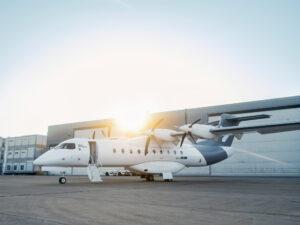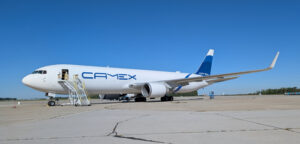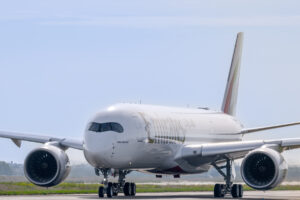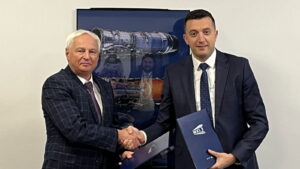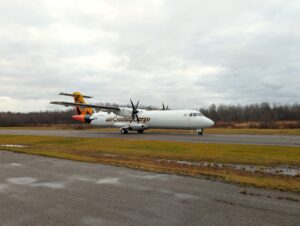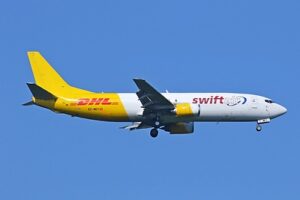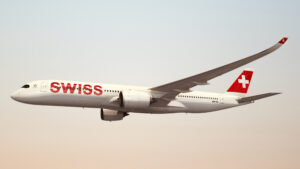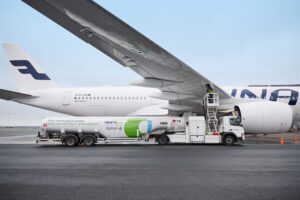Aleksandr (Alex) Celiadin is a serial entrepreneur best known for establishing and developing premium ACMI airlines – GetJet Airlines. Alex operates a number of businesses in the aviation industry and has offices in the UAE, Lithuania, Latvia, Malta, and Cyprus. Last year, GetJet Airlines had a stellar growth year, growing its revenue to over 200 million USD and EBITDA to over 30 million USD.
Alex, what inspired you to establish GetJet, and what market gaps did you aim to address?
I was born and raised in Vilnius, Lithuania, right next to the airport, and my father was an aviation engineer. Being so close to the aviation world, it was never a question of which industry I would be in; it was only a matter of opportunity. My commercial aviation career started in 2008 at Aurela Airlines as a charter sales assistant, where I witnessed Lithuania's first privately-owned airline evolve and enter the global charter and ACMI market with two Boeing 737-300CLs and two Boeing 757-200s. Unfortunately, the company ceased operations in 2011. However, that turned out to be my opportunity to partner with an aircraft owner and eventually set up what is today called GetJet Airlines, with a clear vision of covering the market gap in ACMI leasing.
At GetJet, we focus on quality, not quantity—our strategy is one of modest growth in terms of fleet size. This includes maintaining a core in-house team of engineers and crews, with as few transitions, registration changes, and crew rotations as possible. This strategy not only helps control costs but also ensures that we can continue to provide reliable, premium services to our customers, regardless of the season. This focus on the right assets and a customer-centric approach is why we have consistently delivered one of the best premium products in the market.
GetJet registered $200 million in revenue last year with almost 20% profitability ($30 million USD net profit)—what were the key factors driving this growth? Can you briefly share how your other ventures, including Airhub Aviation, work cohesively and complement each other's operations?
The recovery of the aviation market to pre-pandemic levels has been crucial. We capitalized on the increased demand for ACMI services as airlines sought reliable partners to quickly scale their operations. A significant part of our profit growth comes from our strategic focus on delivering premium service quality and flexibility, which has helped us attract and retain a loyal customer base. Our dedicated and highly skilled team has also been instrumental in maintaining operational efficiency.
We are targeting healthy growth, around 10-15% annually. Our group companies, like Airhub Aviation, enhance our capacity for asset management and aviation solutions. While GetJet Airlines is an ACMI provider, Airhub Aviation is a Part-145 CAMO, engineering, asset management, and fleet support services provider. We handle all fleet transitions, engineering, line maintenance, and repair management exclusively in-house through Airhub Aviation.
Naturally, expanding Airhub Aviation into a full-scope in-house MRO organization will further increase our competitiveness and uniqueness in the market, with the main focus on bringing value to our esteemed airline customers. Airhub Aviation has passed proof of concept by serving the GetJet Airlines fleet, as well as various lessors and small airlines. Therefore, it is ready to take the next step and expand its services to worldwide third-party customers, starting this winter season, which is a peak season for maintenance events on fleets across the world.
How did GetJet's agility enable you to seize market opportunities and navigate challenges effectively?
Agility is our competitive advantage. At GetJet, we've built a reputation as a top crewed aircraft leasing company because we can quickly mobilize and adapt our resources to meet the industry's ever-changing demands. Throughout the years, GetJet has built a reputation as a premier crewed aircraft leasing company that will “save flights” for various airlines. Unlike larger ACMI companies, which are powerful but slow to change, we operate more like a sports car—or as we call ourselves, a Formula 1 team. We're great at rapid acceleration, which allows us to quickly adapt to the dynamic conditions of the aviation market.
We don't focus on size but on agility and service quality. We aim to deliver premium service rather than just grow for the sake of it. This focused approach helps us address our clients' critical needs promptly and effectively. When a client anywhere in the world needs a crewed narrow-body aircraft, our 24/7 sales team is ready to deliver and depart within two hours of getting the call.
The aviation industry is highly seasonal. Moving into the winter period, how does GetJet manage these fluctuations to maintain its premium service and effective operations year-round?
The aviation industry is seasonal, no doubt. Summer is a highway mode, while winter puts most into a garage mode. We don't overextend ourselves with a fleet that sits idle half the year. About 50% of our aircraft are on solid, long-term contracts, which means stable revenue year-round. The rest go through rigorous in-house maintenance and upgrades during the off-season. So, when things heat up, we're ready.
This setup lets us stay sharp and keep quality high without wasting resources. Our crews get well-deserved time off after each peak season, and we maintain total control of our operations. Being a focused ACMI airline means we're agile, cost-effective, and always delivering top-tier service.
GetJet's success relies on a team of 900 aviation professionals. How do you approach talent acquisition and retention in such a competitive industry?
One of the fundamental principles of GetJet is hiring the right people. Here in the Baltic States, we've managed to put together a great team at GetJet. Honestly, they're some of the best in Europe. We've built our reputation on agility and service quality, so naturally, our team must embody those values—quick to adapt and focused on delivering excellence.
Our competitive advantage is being renowned as a premium ACMI provider. Additionally, our fleet diversity allows us to select the best aircraft for specific customers and markets, making us an attractive employer for a wide range of aviation professionals.
When it comes to retention, a lot of talent has grown together with GetJet Airlines over the years. During the challenging times of COVID, we lost some of our team and had to regroup and rehire afterward. Now, it's not as difficult to find the right people, as GetJet is well-known in the aviation community. Plus, those who love aviation tend to stay in the industry for life, and we're fortunate to attract those passionate individuals.
How do you manage the cultural and operational diversity across your global offices? And how has being based in Dubai influenced your business strategies and expanded your global network?
Being based in Dubai, a major aviation hub, allows me to network more effectively with key industry players, stay at the forefront of industry developments, and quickly respond to global trends. Our team at GetJet Airlines is incredibly diverse, with people from 15 different nationalities bringing a wide range of perspectives and skills to the table.
You've emphasized a balanced executive board with a 50/50 gender ratio. How does diversity at the leadership level impact the decision-making process and company culture at GetJet?
Having a diverse leadership team sets the tone for the entire company. At GetJet, about 50% of our management and administrative positions are held by women, which is remarkable in an industry traditionally dominated by men. Also, where women's participation in STEM fields—and by extension, aviation—has historically been lower. We hope our example will challenge the status quo and inspire the next generation of female leaders in aviation.
Studies show that teams with gender diversity are better at identifying and mitigating risks, a critical aspect in safety-driven industries like aviation.
What impact did OEM supply chain challenges and labour shortages have on your operations, and what strategies did you implement to address them?
In 2024, a significant portion of our sales was positively affected by delays from OEMs, ongoing engine issues, and disruptions in the supply chain. Therefore, demand for ACMI services remained strong this summer. July was the busiest month from an operational perspective, with GetJet achieving 5,000 hours operated per month.
To address these challenges, we are investing more in our in-house management and maintenance capabilities to gain even more independence from industry-wide supply issues and third parties. By boosting our stock with engines, spare parts, equipment, qualified manpower, and processes, we are altogether equipped to deliver a full cycle of ACMI services internally. This approach generally results in fewer disruptions and less dependency on supply chain issues, ensuring that our service is the most stable on the market and we almost never let down our customers.
What key trends do you see shaping the ACMI leasing sector, and how is GetJet positioning itself to capitalize on these trends?
I believe smaller, independent ACMI airlines will continue to thrive as the demand for flexibility, efficiency, and reliability remains the top priority for ACMI customers. The global nature of the industry assures me that airlines worldwide will increasingly rely on ACMI services for quick problem-solving, rapid scalability, and flexibility, even five or ten years from now.
In today's market, with plenty of rivals and competition, reliability has become a significant issue. To control our product and avoid disruptions in the supply chain, we plan to reinvest most of our profits into vertical group expansion.
Could you tell us more about your short-term and long-term plans for expanding GetJet's services and market reach?
Strategically, we plan to reinvest most of our profits ($30 million USD net profit in 2023) for vertical group expansion. This includes acquiring assets and expanding in-house rotables stock, and our base maintenance capabilities are a natural step to control our product and avoid the impacts of supply chain disruptions and other issues our industry is facing.
As of today, our Dubai-headquartered group company, Airhub Aviation, is already acting as a full-scope CAMO, repair management, and line maintenance provider for our fleet of Boeing and Airbus aircraft across all worldwide bases we operate from, whether it's Lithuania, Nigeria, Paris, Spain, India, or Canada.
Naturally, expanding Airhub Aviation into a full-scope base maintenance and component repair organization will further increase our competitiveness and uniqueness in the market, with the main focus on bringing value to our esteemed airline customers.
Regarding GetJet Airlines, we serve around 35 different returning client airlines per year, and we see it as our obligation to ensure that our fleet is properly maintained. This includes maintaining an excess stock of spare parts, engines, and APUs at our home base, along with having the right amount of in-house flight and maintenance crews to handle any challenges the industry throws at us.
We concentrate on maintaining our “magic number” of 20 aircraft, with a target of owning most of our assets that our customers can trust and rely on. Over the next 5-10 years, our plan is to continue purchasing airplanes rather than dry leasing them, and at the right time, invest in newer Boeing and Airbus models. Our main investments will be in engines, major aircraft components, and fleet support services, as well as reducing the airframe ages and updating the interiors and exteriors of our existing fleet.
So, while our fleet size may remain relatively stable, our capacity and capability to serve our clients will enhance significantly.
What are some of the key lessons you've learned from your 15+ years in the industry? And what advice do you have for aspiring entrepreneurs in the aviation sector?
Early on, I realized that as the founder, I'm not necessarily the best person to be the chief executive, so I focused on finding the best managers to do the job. Now, I'm proud of our team—talented, committed people who are the backbone of our high-quality service.
The COVID-19 pandemic was a huge test for the aviation industry, threatening to ground passenger flights indefinitely. But it also taught us the value of staying adaptable in turbulent times. Under pressure to keep the company afloat for our employees, we quickly pivoted, repurposing passenger planes for cargo transport. We flew medical supplies worldwide and were the first airline to ship COVID vaccines into Lithuania. It was a reminder that while our customer base shifted, our commitment to service didn't. And it is all about the people after all.
That said, you never know what challenges your business will face. Learn to be resilient and ready to pivot when needed.
Entrepreneurs can often get caught in a different kind of rat race—striving to become the biggest, the best, the most impressive. I don't want my company to be the biggest airline in the world, but I do want it to be the most profitable premium provider in our sector. Don't let anyone else define success for you or your company. Your journey is yours alone. Stay open, agile, resilient, and humble, and stay focused on what matters most to you.






